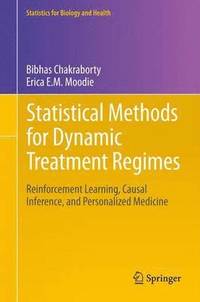
- Format
- Häftad (Paperback / softback)
- Språk
- Engelska
- Antal sidor
- 204
- Utgivningsdatum
- 2015-02-08
- Upplaga
- 2013 ed.
- Förlag
- Springer-Verlag New York Inc.
- Medarbetare
- Moodie, Erica E.M.
- Illustrationer
- XVI, 204 p.
- Dimensioner
- 235 x 155 x 10 mm
- Vikt
- Antal komponenter
- 1
- Komponenter
- 1 Paperback / softback
- ISBN
- 9781489990303
- 338 g
Statistical Methods for Dynamic Treatment Regimes
Reinforcement Learning, Causal Inference, and Personalized Medicine
- Skickas från oss inom 7-10 vardagar.
- Fri frakt över 249 kr för privatkunder i Sverige.
Passar bra ihop
De som köpt den här boken har ofta också köpt The Anxious Generation av Jonathan Haidt (inbunden).
Köp båda 2 för 1242 krKundrecensioner
Recensioner i media
From the reviews: "Overall, the book provides an excellent reviewof DTRs up to date. After finishing reading the book, I planned to create a post-graduate seminar course on this topic using this book as a textbook. I enthusiastically recommend this book. This book will be a valuable reference for anyone interested and involved in research on personalized medicine." (Hyonggin An, Journal of Agricultural, Biological, and Environmental Statistics, April, 2015) The intended audience includes physicians, clinical researchers, physicians in training, statisticians, and medical students, as well as masters and doctoral students in the field of biostatistics and epidemiology and computer scientists. This book provides a concise summary of the key findings in the statistical literature of dynamic treatment regimes. The simple language and well-organized chapters are unsurpassed attributes of this book. It will be an exceptional resource for quick review. (Parthiv Amin, Doodys Book Reviews, November, 2013)
Övrig information
Bibhas Chakraborty is an Assistant Professor of Biostatistics at the Mailman School of Public Health, Columbia University. His primary research interests lie in dynamic treatment regimes, machine learning and data mining including reinforcement learning, causal inference, and design and analysis of clinical trials. He received a Bachelors degree from the University of Calcutta, a Masters degree from the Indian Statistical Institute, and a Ph.D. in Statistics from the University of Michigan. He is the recipient of the Calderone Research Prize for Junior Faculty from the Mailman School of Public Health, Columbia University, in 2011. Erica Moodie is an Associate Professor of Biostatistics in the Department of Epidemiology, Biostatistics, and Occupational Health at McGill University. Her main interests lie in causal inference and longitudinal data with a focus on methods for HIV research. She is an Associate Editor of The International Journal of Biostatistics and Journal of Causal Inference. She received a bachelor's degree in Mathematics and Statistics from the University of Winnipeg, an M.Phil. in Epidemiology from the University of Cambridge, and a Ph.D. in Biostatistics from the University of Washington. She is the recipient of a Natural Sciences and Engineering Research Council University Faculty Award.
Innehållsförteckning
Introduction.- The Data: Observational Studies and Sequentially Randomized Trials.- Statistical Reinforcement Learning.- Estimation of Optimal DTRs by Modeling Contrasts of Conditional Mean Outcomes.- Estimation of Optimal DTRs by Directly Modeling Regimes.- G-computation: Parametric Estimation of Optimal DTRs.- Estimation DTRs for Alternative Outcome Types.- Inference and Non-regularity.- Additional Considerations and Final Thoughts.- Glossary.- Index.- References.


